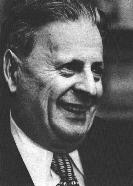|
|
|||||||||||
|
The Sacred vs. the Holy |
|||||||||||

|
Instructor: Marsha B. Cohen How is the holy different from the sacred? This advanced text course will focus on Emmanuel Levinas' discussion of Sanhedrin 67a-68a, exploring the "sacred" realm of sorcery, illusion and magic in the Talmud. In the fearless quest for the "scent of holiness," we will traverse fields of illusory cucumbers, debate the kashrut of conjured calves, and recount the final moments of the excommunicated Rabbi Eliezer, whose supernatural proofs of his halachic arguments had been rejected by his colleagues. (Very advanced text course--beginners beware!)
* * * * * * * * * * * * * * * * * |
||||||||||
|
Recommended Course Preparation Please do NOT rush out and borrow or buy everthing written by and about Levinas. While his secular writings are a major contribution to 20th century philosophy, even according to Levinas himself they have little relevance to the writings on Talmud with which we will be dealing this summer.
I highly recommend starting with Judith Friedlander's VILNA ON THE SEINE: JEWISH INTELLECTUALS IN FRANCE SINCE 1968(New Haven: Yale University Press, 1990) if you can find it. A very interesting chapter is devoted to Levinas, and several others discuss his influence in European and Jewish philosophy. Colin Davis's LEVINAS: AN INTRODUCTION (University of Notre Dame Press: 1996, ISBN: 0-268-01314-4 pb) is a very good introduction to Levinas' general and Jewish writings. For our purposes, the "Introduction" and the chapter on "Religion" are the most useful. If you're interested in modern philosophy you might also want to read the rest. "Emmanuel Levinas: Philosopher and Jew," the fifth chapter of Richard A. Cohen's ELEVATIONS: THE HEIGHT OF THE GOOD IN ROSENZWEIG AND LEVINAS (University of Chicago Press: 1994, ISBN: 0226112756 pb), is an exceptionally cogent and readable intellectual biography of Levinas, and the book itself is one of the very few devoted to Levinas as a specifically Jewish thinker, written by an author with a genuine knowledge and understanding of Judaism. (Other Levinas chapters in the book include "The Metaphysics of Gender" and "The Face of Truth and Jewish Mysticism." If you are a Rosenzweig fan, you'll find the first half of the book of great interest as well.) As for Levinas' own works, I suggest beginning with DIFFICULT FREEDOM: Essays on Judaism , translated by Sean Hand (Johns Hopkins University Press, 1997: ISBN: 080185783X pb). The essays provide numerous insights into Levinas' conception of Judaism and his approach to Talmud. NINE TALMUDIC READINGS, translated by Annette Aronowicz (ISBN: 0253208769), is, as the title indicates, devoted exclusively to his Talmudic lectures, as are BEYOND THE VERSE, translated by Gary D. Mole (ISBN:0253332885)and IN THE TIME OF THE NATIONS, translated by Michael B. Smith (ISBN:0253332958),all three published by Indiana University Press in 1994. |
Richard Cohen's translation of three NEW TALMUDIC READINGS (Duquesne University Press: 1999, ISBN: 0820702978) includes one complete lecture and two drafts or sets of working lecture notes, which have been compiled into lecture format and published posthumously. (No, Marsha is not related to Richard Cohen, although we are good friends.) The Introduction and first chapter ("Aggadic Man") of Adam Zachary Newton's just published THE FENCE AND THE NEIGHBOR: Emmanuel Levinas, Yeshayahu Leibowitz and Israel Among the Nations (SUNY Press: 2001, ISBN:0-7914-4784-7) gives an excellent and in-depth analysis of Levinas' approach to Talmud, with reference to other Jewish thinkers such as Maimonides and the late Rabbi J.B. Soloveitchik. Highly recommended. BTW, if you read French fairly fluently, you might try reading some of Levinas' work in the original French. As with all languages, there are subtleties and nuances which even the best translations into English can't convey. Copies of the text we'll be studying in class will be available in French as well as English. But English alone will suffice for the course. Again, don't get bogged down in secular academic critiques of Levinas' philosophy, and try to avoid the Derridian approaches, unless you really have a personal penchant for such things. We are not going to be arguing about Heidegger, Husserl, Derrida, etc., which have no connection to Talmud. The course is devoted exclusively to Levinas' writings on Talmud, informed by Levinas' approach to Judaism, not to postmodern philosophy, Jewish or secular. So don't the pomo stuff scare you away. If you have any questions or concerns, please feel free to contact me. Marsha |
||||||||||
|
|||||||||||
|
|||||||||||